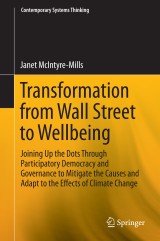Details

Transformation from Wall Street to Wellbeing
Joining Up the Dots Through Participatory Democracy and Governance to Mitigate the Causes and Adapt to the Effects of Climate ChangeContemporary Systems Thinking
|
53,49 € |
|
| Verlag: | Springer |
| Format: | |
| Veröffentl.: | 02.09.2014 |
| ISBN/EAN: | 9781489974662 |
| Sprache: | englisch |
Dieses eBook enthält ein Wasserzeichen.
Beschreibungen
Transformation from Wall Street to Well-being: Joining up the dots through Participatory democracy and governance to mitigate the causes and adapt to the effects of climate change addresses accountable leadership, supports collective interests, ethical governance and fairness to future generations in order to develop systemic approaches relevant to these issues. The humanistic focus, whilst central, addresses how we see ourselves in relation to the environment. It explores cultural perspectives in developed and developing parts of the world where people have a closer connection with the natural environment in comparison to those who live in cities. Furthermore the book discusses participatory action research to prefigure a means to hold the market to ensure that the use of resources that are necessary for the common good are accessible and equitable. The essential systemic aim this book offers is to balance human needs with nature. The research summarizes the discourses and the adaptive praxis in order to develop a bridge between cosmopolitan ethics and cosmopolitan governance. It does this in the interest of supporting and using cultural designs for living that support quality of life and spans five core domains as explained by the author. Overall, this monograph helps evaluates the extent to which the introduced approaches enable the community to consider their perceived assets and risks and the implications of their consumption choices.
Introduction and Overview.- Vulnerability and risk: Towards stewardship of a post carbon economy.- Facing up to fin de siecle culture.- New Regionalist monitory democracy and governance: A reply to the so-called problem of cosmopolitan politics.- Greed and Complicity: Responsibility to others and future generations.- Conclusion: towards a nonanthropocentric stewardship approach.- Post Script: responding to existential risks.- Executive Summary.- User Guide: For Engagement to address climate change through participatory democracy and governance.
<p>Janet McIntyre-Mills is Associate Professor Flinders University, and Adjunct Professor University of Indonesia. Her books address social and environmental justice concerns and include, for example: ‘Global Citizenship and Social Movements’, Harwood, McMillan, ‘Critical Systemic Praxis for Social and Environmental Justice’, Springer; ‘Systemic Governance and Accountability: working and re-working the conceptual and spatial boundaries,’ published by Springer; ‘User Centric policy design to address complex need’s, Nova Science. Emergence has recently published ‘Identity, democracy and sustainability’. It proposes a new architecture for governance.</p><p>Her research addresses wellbeing, consciousness and cosmopolitan ethics associated with the design and transformation of governance and democracy. It focuses on excessive social, economic and environmental consumption and suggests ways to mitigate the worst impacts of climate change through protecting cultural ecosystems. She is a board member of several journals, including the Journal of Globalization Studies, Systems Research and Behavioural Science, for example. She is an elected board member of Research Committee 10 on Participation and Organizational Transformation of the International Sociological Association, and has participated in Research Committee 51 of Socio-cybernetics. She is also a member of the International Systems Sciences and the Action Learning and Action Association.</p>
<p>This book has two main objectives. The first is to make the case for social change through exploring post disciplinary and post materialist frameworks to address greed, zero sum competition for resources, the commodification of the powerless and the environment. Secondly, it develops a reframed approach to measuring wellbeing – not productivity – as a sign of economic success. Thus the book considers the challenge posed by Stiglitz (2010) to the Australian Productivity Commission, namely to foster an understanding that the wellbeing of humanity is dependent on the global commons. </p><p><i>Transformation from Wall Street to Wellbeing </i>also examines whether a change in the architecture of democracy and governance could balance individual and collective needs more effectively through participation, guided by the axiom that people ought to be encouraged to be free and diverse; but only to the extent that freedom and diversity does not undermine the rights of others. What does this mean for constructing and re-constructing the way in which we live? This volume makes a case for cosmopolitan approaches that scale up local engagement and that enable monitory democracy from below. Instead of Big Brother controlling the people who are unable to think critically, people are encouraged to monitor the use of resources locally. The process of monitoring needs to be supported by means of the principle of subsidiarity and buttressed by international law spanning post national regions. It discusses participatory action research to prefigure a means to hold the market to account – to ensure that the use of resources that are necessary for the common good are accessible and equitable.</p><p>This is the companion book to <i>Systemic Ethics and Non-Anthropocentric Stewardship: Implications for Transdisciplinarity and Cosmopolitan Politics, </i>also by the author. The two volumes comprise a series of essays that can be read separately and in any order or aschapters on a common theme, namely, “How should we live?”</p>
Invites readers to participate in sustainable and ethical governance Develops a reframed approach to measure wellbeing – not productivity – as a sign of economic success Makes the case for social change through exploring post disciplinary and post materialist frameworks to address greed, zero sum competition for resources, the commodification of the powerless and the environment Includes supplementary material: sn.pub/extras
Diese Produkte könnten Sie auch interessieren:

Mapping Sustainability

von: Nazli Choucri, Dinsha Mistree, Farnaz Haghseta, Toufic Mezher, Wallace R. Baker, Carlos I. Ortiz

96,29 €

Fertility, Living Arrangements, Care and Mobility

von: John Stillwell, Ernestina Coast, Dylan Kneale

96,29 €














